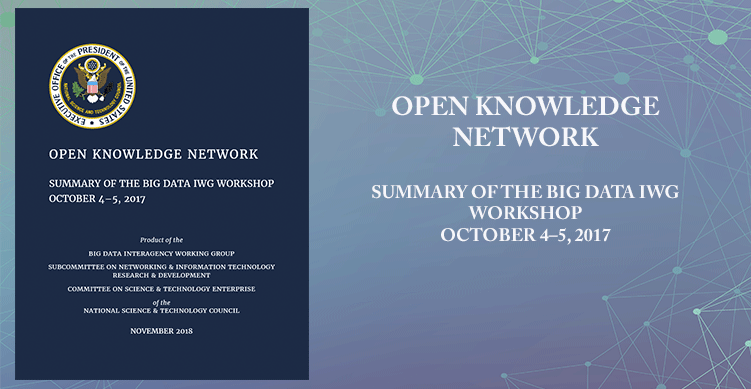View Full Text: Open-Knowledge-Network-Workshop-Report-2018.pdf
Technology companies develop proprietary knowledge networks as key business technologies today. However, because these networks are proprietary and expensive to construct, government, academia, small businesses, and nonprofits do not have access to them. In contrast, an open knowledge network (OKN) would be available to all stakeholders, including the researchers who will help push this technology further. An OKN requires a nonproprietary, public–private development effort that spans the entire data science community and will result in an open, shared infrastructure.
This infrastructure has the potential to drive innovation across science, engineering, and finance and to achieve economic growth comparable to the impact of the Internet in the early 1990s. Just as the Internet began as an attempt to link files and then became a major infrastructure, the OKN is intended to link data about related entities. For example, many government agencies have been investing in efforts to create specialized knowledge networks in domain-specific areas such as genomics, astronomy, physics, or the geosciences. However, fusing these islands of knowledge currently requires enormous effort. Like the Internet, an OKN would provide such an infrastructure, building upon and significantly enhancing the capabilities of existing data resources.
With access to the OKN, researchers could develop more robust and efficient approaches to answering questions, more expressive frameworks to capture knowledge, and natural language interfaces to access that knowledge.
Since July 2016, the Big Data Interagency Working Group (BD IWG) has been involved in meetings to discuss the viability of and possible first steps to creating a national public-private data network infrastructure, the Open Knowledge Network (OKN). The goal is to develop an easily accessible knowledge infrastructure that can facilitate and empower a host of applications and new research avenues for the public, private, and academic sectors.
On October 4–5, 2017, the Big Data IWG hosted a workshop to bring together Federal, industry, and academic stakeholders to discuss issues related to advancing a national-scale OKN. Workshop breakout sessions discussed OKN issues for a horizontal, technological domain and for four specific vertical domains: biomedicine, geosciences, finance, and smart manufacturing. Workshop participants noted that an effective OKN would drive the next wave of artificial intelligence breakthroughs, transform domains ranging from scientific research to commercial applications, and enable services such as recommendation systems, translation systems, social media services, and intelligent search agents. The “Open Knowledge Network: Summary of the Big Data IWG Workshop” report summarizes the workshop discussions.


